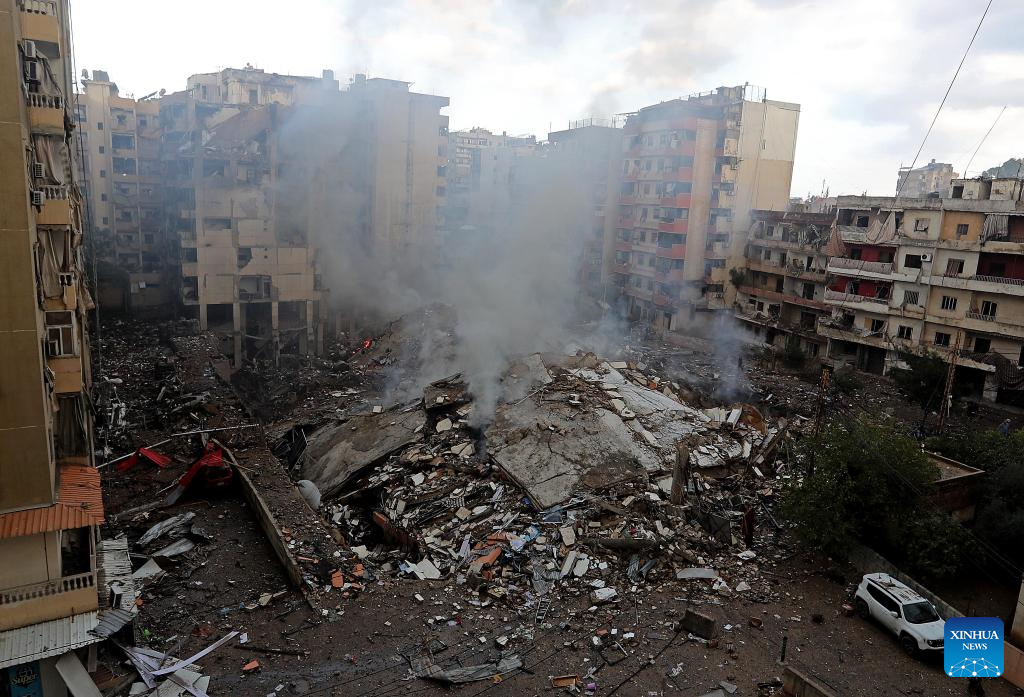An area of tightly packed blocks of flats, shops and businesses, Beirut’s southern suburbs are also home to Hezbollah’s main institutions…reports Asian Lite News
Beirut’s southern suburbs, a stronghold of the Hezbollah militant group, are usually teeming with life but on Wednesday the rubble-strewn streets and burning buildings were almost empty after days of Israeli bombardment and evacuation orders.
Photographers saw thick smoke rising from buildings hit by overnight strikes while young men on mopeds sped along largely empty roads and residents grabbed what they could from their homes, some driving off with mattresses tied to car roofs.
Mohammed Sheaito, 31, one of the few not leaving, said that “during the night, the ground shook below us… and the sky lit up” from the force of the strikes.
“The area has become a ghost town,” said the taxi driver, who has sent his parents, his sister and her children — already displaced by Israeli bombing in south Lebanon — to safety elsewhere.
An area of tightly packed blocks of flats, shops and businesses, Beirut’s southern suburbs are also home to Hezbollah’s main institutions.
Israel says it is targeting sites belonging to the Iran-backed militant group, which was founded during the Lebanese civil war after Israel besieged the city in 1982.
A series of Israeli raids last week hit the southern suburbs — known as Dahiyeh — before a massive strike on Friday killed Hezbollah chief Hassan Nasrallah, with raids on the area increasing after that.
Thousands have fled the bombings or because of Israeli army evacuation orders on social media posted ahead of some strikes.
Some are staying with relatives, others in schools turned shelters in Beirut or in rented flats, while those with nowhere to go have been sleeping on the streets.
“The area was full of people. We used to sit at the cafe or along the street, older people would play backgammon,” Sheaito said.
Now, everything is “closed — corner stores, restaurants… even the pharmacy,” he said, adding: “I leave Dahiyeh to buy food supplies.”
Mohammed Afif, the head of Hezbollah’s information office, told journalists on a media tour that was broadcast that all the buildings hit in Dahiyeh were “civilian buildings and are not home to military activity.”
In one neighborhood, emergency workers combed the rubble of a flattened four-building residential complex in a grim search for survivors. In another, a woman carried a cat as a building burned.
Rubble blocked some streets, with burnt-out cars scattered around various strike sites.
“I came quickly to get our identify papers and some other things,” said one resident who declined to be identified, expressing shock at finding an eight-building residential complex behind his home had been destroyed. He said the neighborhood was uninhabitable, with no water, shops, petrol stations or even electricity because generators had shut down in a country where the state network struggles to supply a few hours of power a day.
“Our apartment is full of dust and there is a strange smell — I left quickly before I choked,” he said. “I only saw one or two people on the street. There is no life here anymore.”
Germany flies out Beirut embassy staff
Meanwhile, Germany flew out its Beirut embassy’s non-essential staff, their dependants and some of its citizens in Lebanon with medical conditions, officials said.
About 110 passengers were aboard the German air force A321 plane, including diplomats, other personnel and some citizens considered in a vulnerable condition.
The foreign and defense ministries earlier announced the special flight “to support the departure of the colleagues and their families” as well as staff of some German partner organizations from strife-torn Lebanon.
“German nationals who are particularly at risk due to medical circumstances are also being taken,” said the statement.
Israel has been bombing targets of the Iran-backed militant group Hezbollah in Beirut and eastern and southern Lebanon, in strikes that have killed hundreds and forced hundreds of thousands more to flee their homes.
The Beirut embassy remained operational to help the estimated 1,800 German citizens in the country.
“The embassy continues to support the remaining Germans in Lebanon in their departure via commercial flights and other means,” the statement added.
At the weekend, Berlin raised its alert level for the missions in Beirut, Tel Aviv and Ramallah in the occupied West Bank.
A German government spokesman on Monday said that “we are currently at a stage where we support the departure (of citizens) but we are explicitly not in an evacuation scenario.”
The statement reiterated that “all Germans in Lebanon have been urged to leave the country since October 2023.”
Hezbollah began low-intensity cross-border strikes on Israeli troops a day after its Palestinian ally Hamas staged its unprecedented attack on Israel on October 7, triggering war in the Gaza Strip.
Israel said earlier this month it was shifting its focus from Gaza to securing its northern border with Lebanon, in order to allow Israelis displaced since October to return to their homes.
Hezbollah vowed on Monday to keep fighting Israel and said it was ready to face any ground operation into Lebanon, after its leader was killed in an air strike that dealt the group a seismic blow.

Leave a Reply